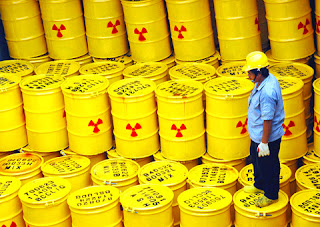The management of nuclear waste disposal is frightening for many people. People are concerned because of the scale of problems that would result from human error. Errors that have occurred in the past frighten individuals into thinking that nuclear energy and nuclear products should be avoided. Also, because nuclear power can be harnessed into weapons of mass destruction, this has made nuclear a feared word.
Nuclear waste can be dangerous. Radioactive products, nuclear byproducts resulting from use in modern medicine,
and products such as uranium, and plutonium are a concern.
Responsible management of these products is crucial to environmental
safety and the safety of residents.
As
many nuclear power plants are coming to the end of their lifecycle,
citizens are concerned with how they will be managed. Nuclear waste
is stored and the concern of a leak or accident is very troubling. The
fact is that organizations responsible for the management of nuclear
waste disposal are accountable and run under very detailed and careful
processes and regulations with inspections and detailed safety measures.
Nuclear energy is clean and safe. Stories
about situations like Chernobyl in the Soviet Union frighten people.
In that situation, the lid from a Nuclear reactor blew and the
resulting fire and radioactive contamination that spread resulted in
many deaths. To this day, 3,000 square miles around that power plant
remain quarantined due to the contamination. Accidents do happen but
overall the management of nuclear waste is handled responsibly.
Unfortunately, what happened at Chernobyl taught lessons to power
authorities on how handle such situations and has helped to prevent
such things from occurring on a larger scale.
Nuclear Energy
has reduced the world’s dependency on coal and oil. Using coal to
create electricity results in many more environmental concerns. The
byproducts of coal are excessively worse to the environment than the
byproducts of nuclear energy and nuclear waste is more easily contained
and disposed of than that of coal. Nuclear waste’s toxicity has a
shelf life and an expiration date. Coal power byproducts do not.
In managing nuclear waste, some products are
buried in sealed containers for either long term or short-term storage.
Other products go through a process of transmutation. Transmutation
takes the nuclear waste and transforms it into a less harmful product
or to a product with a shorter shelf life. All in all, most countries
through careful processes are very responsible about nuclear waste
disposal.

